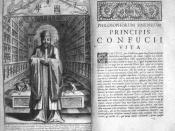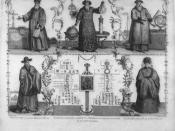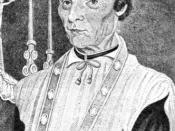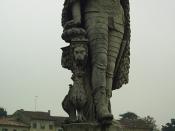The Mission The river roared, yet it could not drown out the cries of my mother and father being wrongfully slain. The cross was held high, and when shot down it was repeatedly raised till the last man stood. It was a sign of courage. It was a sign of faith. It was a sign of death. In 1751 the Jesuits climbed the falls and spread the Gospel to us, the indigenous tribe of present day Paraguay. Without force they shared the Word, and helped us in constructing churches and farms resulting in fully functional missions. Father Mendoza, who took asylum with the local church, had previously killed his brother. He was once a slave trader, but when we first met he had just completed his penance. Following the Jesuits, who "represent"ÃÂ Spain, came the Portuguese. They wanted the land, and in doing so they refused to listen to what our King desired, or demanded.
Our men were left to fight the unattainable fight. The village was destroyed. My father was shot in the river battle led by Mendoza. But worst of all was the sight of my mother and sisters being slaughtered during their final march of hope behind Father Gabriel.
Since 1492 the Europeans have been Exploring and claiming land all throughout the "Americas."ÃÂ With them they have brought their religion, Christianity. Unlike the Spanish or Portuguese explorers, the Jesuits came to us in a gentle manner. At first we were tentative, or slightly hostile, but we learned to love them greatly. Then came the slave traders, one of which was Mendoza. Christians or not we were still animals to them. These people were not concerned with us gaining salvation. Their primary goal was to either abolish us, or use us for economical gain or political leverage. Christianity for these people (not the Jesuits) was an excuse. In the case between the Portuguese and the Spanish over our land, we saw how the monarchy, who was supposed to be holy, was more powerful then the church. If our mission is what the Spanish call a removable limb, then I don't want to be part of the body.
Father Mendoza came to us expecting death, but receiving freedom. He had killed his brother who had committed adultery with his wife. He sought refuge at the church and Father Gabriel helped him find his penance. When he came to us he was no longer a beast, but a gentle loving man learning the ways of God. Within months he became a part of the Jesuit order and was sworn to serve God through love, and obey all that was told to him by Father Gabriel. His love was sincere, but despise for his old friends was deeply rooted inside of him. He called his old employer a liar in the courts in a rage-filled outburst. He wanted so badly for them to leave us alone. He wanted us to be seen as people, not as four-legged animals. And although he didn't understand why he had to, he, under the order of Father Gabriel, apologized for his outburst. In the end, he chose defense over love. He couldn't bare see us killed or even take prisoner. He went against the will of Spain and remained above the falls, and disobeyed Father Gabriel (as did the others) by fighting with us. He knew Father Gabriel was right, but his love for us too deep. The man had served his penance. He had searched for God and found him. He loved us more then he had ever loved, and could not see us die unjustly.
For me, all that is left is 10 of my people. You saw us at the end paddling down the river. The Portuguese ruined all we had, but we moved deeper into the forest and started again. The Jesuits brought Christ with them, but they also brought the Spanish and the Portuguese. Even through the slaughter, I never felt that Christ had left us; it was just that Satan had crept into the mission and destroyed it. I felt betrayed by the Spanish, for they sacrificed us in order to "save"ÃÂ the church in Europe. His Eminence said that you must sacrifice an infected piece in order to keep the body alive. But I ask, what is a body with out its heart? I must admit that Father Mendoza acted as well all would've acted. My personal faith is not one such as Father Gabriel, although I wish it were. His solution to his crime of murder, which was starvation, was saved by Father Gabriel. His outburst in the courts, although justifiable, was wrong and he followed Father Gabriel's orders by apologizing. His final battle was one of love, not of hatred.
After seeing this film for at least the tenth time I am still brought to sadness. The dialogue is simple, the score and cinematography are the best I've heard and seen, but the message of the struggle of outreach and love is what's most touching. The propagation of faith comes with challenges. It is never an easy task, yet it is required of us. The movie shows the ultimate struggle between serving God in a world ruled by men. It teaches us faith and love portrayed differently by both Father Gabriel and Father Mendoza. It shows us sacrifice, which is a necessity when spreading the Gospel. It is the most powerful film of the century, because it delivers the message of faith through love, just as Christ did two thousand years ago.





